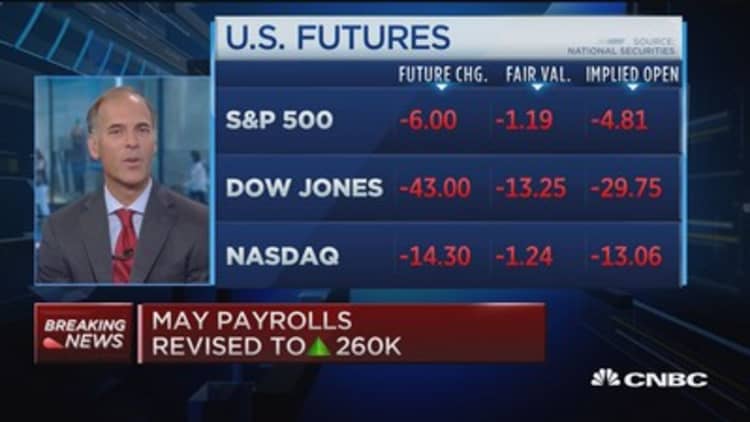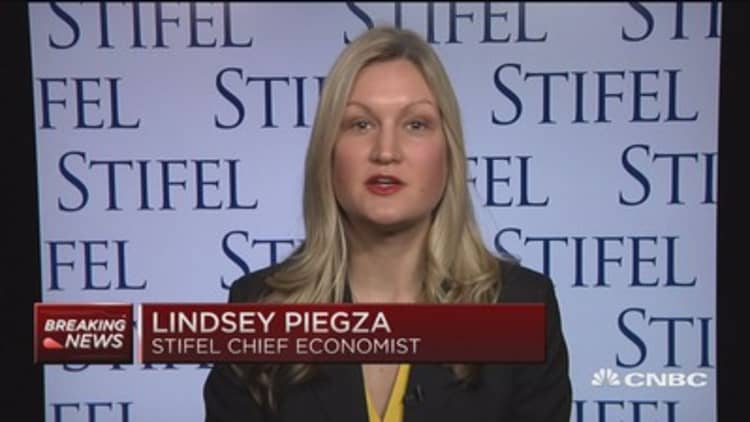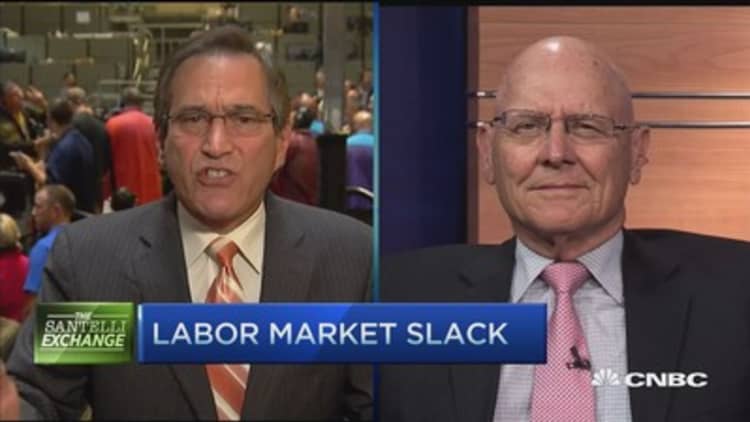
The solid jobs growth in July gives the Federal Reserve little reason not to raise interest rates next month, market watchers said Friday.
Closely followed stock analyst Jim Paulsen told CNBC's "Squawk Box" the numbers keep September in play for Fed liftoff. But he stressed the path for rates in the medium and long term is more important than the exact timing of the first hike in nine years.
Paulsen, chief investment strategist at Wells Capital Management, said he's leaning toward a scenario in which "the market starts to think the Fed is behind the curve."
"If we start to get evidence of significant cost push and pressures as we near full employment, then the start of this process will be more damaging for the stock market," he added.
Paulsen spoke after the Labor Department reported that the economy created 215,000 nonfarm jobs last month, basically matching forecasts of 215,000 to 223,000. The unemployment rate held steady at 5.3 percent and average hourly earnings increased 0.2 percent; both matching forecasts.

Austan Goolsbee, former chairman of the Obama Council of Economic Advisers, said he expects the Fed to hike rates next month. And if they do, policymakers will need to make sure to signal a shallow trajectory, he added.
"I just hope they don't raise them too rapidly or convince the market that they're going to raise them too rapidly," said Goolsbee, a professor at the University of Chicago Booth School of Business.
The American Enterprise Institute's Kevin Hassett, a former Fed economist and ex-GOP campaign advisor, said the central bank has no excuse not to raise rates.
Moody's Analytics Chief Economist Mark Zandi said the Fed has to increase rates next month: "Now is the time. There'll never going to be a better time to raise interest rates."
Zandi helps compile the monthly ADP private payrolls report, which on Wednesday reported that American companies added a fewer-than-expected 185,000 jobs in July.
Read MoreUS private sector jobs fall short in July
The debate on Wall Street has been focused on whether rates would be increased at the Fed's September or December meeting, both of which feature growth projections and a news conference from central bank chief Janet Yellen.
Less than two weeks before its two-day, mid-September gathering, there's one more monthly jobs report—the August data due out on Sept. 4.
The labor market has been recovering more quickly than the overall economy, while inflation has remained stubbornly below the central bank's 2 percent target.



Lindsey Piegza, chief economist at Stifel Nicolaus, broke with consensus, saying the latest labor data is not sufficient to justify a near-term rate increase, in part because the labor pool has not drawn down enough to spark wage pressure.
"The labor market, although improved, still needs further improvement, and looking at inflation, we're still in a deflationary environment," she told CNBC's "Squawk on the Street."
Goldman Sachs chief economist Jan Hatzius also maintained his view that the central bank would only hike rates once this year, in December. He said that call is based on Goldman's impression of the Fed leadership's comments in June and subsequent speeches by Federal Open Market Committee members.
Read More Fed's Lockhart: Sept hike could be 'appropriate': Report
"I think the market's view is that a bigger change has occurred in terms of the communication in last week's [FOMC meeting] statement and in some of the speeches this week," Hatzius told "Squawk on the Street," "We would say it really depends on the leadership, and we haven't seen that kind of signal."
The first read on second-quarter gross domestic product from the Commerce Department last week showed a slightly slower-than-expected growth rate of 2.3 percent. First-quarter GDP was revised to a slight expansion from an earlier contraction.
Despite a pause in the beginning of the year, Credit Suisse's Barbara Reinhard, CIO of the bank's wealth management unit, said she thinks "this whole myth that the consumer is dead is really not the case." Consumer spending accounts for two-thirds of the U.S. economy.
—CNBC's Tom DiChristopher contributed to this story.


